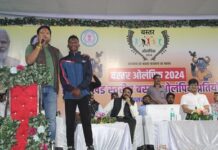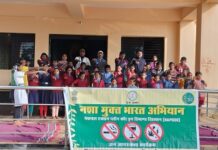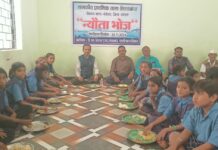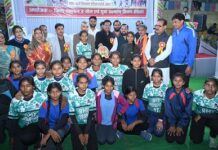NEW DELHI: BJP president Amit Shah is on a 95-day whirlwind tour of the country for organisational mobilization of the party in areas of strength and weakness. here is a quick Q&A session with Mr. Shah.
What is your assessment of three years of the Modi government?
There are achievements in every field as far as the Narendra Modi government is concerned. We are the fastest-growing economy, and we have been able to control inflation. Agriculture has also shown adequate growth, foreign reserves have gone up. With release of 104 satellites recently, we have made a place for ourselves in space technology.
But the biggest achievement of the Modi government has been that the country’s self-confidence has grown. The direction of its growth has been made clear and the scale of the vision for the country has grown. For example, even after 70 years, there are 14,000 villages with no electricity. We don’t decide that 1,000 or 2,000 villages will be electrified, but that not a single village should remain without electricity, not a single home without a bank account; that in the next five years, five crore households will be provided cooking gas. And it is this expectation and the political will of the leadership by Modi ji which generates achievements.
The Army has just carried out aggressive firing across the Line of Control and had undertaken surgical strikes last year as well. What is behind this aggressive policy?
In the field of defence, the decision to go through with surgical strikes has made the entire world change the way it looks at India — that the Modi government is firm in its actions, and this image has been established. It is a decisive government that backs its Army. Both the Army and the Central government have indicated by these actions that not only do they care about the safety of our borders but also the honour of our soldiers. Tuesday’s action has raised not just the morale of the Indian Army but also the entire country.
There is a view that the government has not been as aggressive on economic reforms as its numerical strength would have supposed.
There is a difference in the way that pink papers define economic reforms and the way that the government, led by Narendra Modi ji , does. For me, this government has done its utmost to positively affect the GDP through acts that liberate the economic potential of our most disadvantaged citizens. It has been transformative in its approach. For example, if you build a toilet in a house where the young girls there had no access to it and feared for their safety every day, or you provide cooking gas to a woman who spends hours in a day collecting firewood and toiling in a smoky kitchen, it is a liberation of a most basic sort, one that truly empowers them.
The economic reforms that this government has undertaken have been more than what any government has done in the last 22 years. Decisive steps have been taken towards a transparent economy through GST, the Jan Dhan Yojana, Direct Benefit Transfer (DBT) through Aadhaar. It has been aligned with schemes like Ujjwala Yojana, Mudra, crop insurance, e-markets, which are reforms geared at access to institutional credit and public services.
Many feel that demonetisation did not serve the purpose for which it had been undertaken.
It is easy to be dismissive of this decision but to demonetise a huge load of currency of 1.25 billion people was a courageous thing. As far as achievements are concerned, the huge amount of currency hidden away in the homes of the corrupt, even political leaders is now in the system, and is available for use in development schemes. Today, no one can say that the money is outside the system, and tracking and trailing of black money arising out of this exercise is going on.
Other than that, for 91 lakh PAN cards to be issued in one year, the hike of 18% in direct and indirect taxes collected in the space of a single year is an effect of demonetisation. In the coming days, budgets of both the Union and State governments will go up by over one-and-a-half times, thanks to demonetisation and the imperative of doing business in white economy due to the GST.
You have frequently separated the electoral victories of your party from the need to increase the ideological acceptance of the BJP. Aren’t elections an endorsement of an ideology?
I do say this, because I believe that without ideology any political party becomes just a machine to win elections and ultimately it does not do any good to the country and people.
Are you referring to the Congress?
I am referring to many such parties. Those that abandon ideology are reduced purely to an election-winning machine. The BJP was established because we believed in a certain ideology and from the Jan Sangh to our reason for parting ways from the Janata Party, was purely ideological. Today, we have been able to establish a different path in governance at the Centre and in the various States where we have a government because of ideology.
The BJP is perceived as a north Indian party in the South; your 95-day tour is expected to give it a fillip in these States. How do you propose to bridge the cultural gap?
If language, culture and food could divide us, we would not be a nation. The core of India is Bharatiyata , which is above all other cultural differences.
The poor face similar problems in north, east and south. The way the Modi government has worked for poor in last three years, BJP has become the favourite party for all marginalised sections which includes Dalits, tribals and farmers. I am confident that this image of Modi ji will help us expand our party in the South as well other regions of the country. Our party work will be taken forward by leaders and workers from the States, so where is the question of a cultural gap? I am spending 24 days in the south, including Lakshadweep, Telangana and Tamil Nadu, and I believe that people will support the BJP in the south in a big way in the coming days.
There is speculation that film star Rajinikanth may join the BJP.
Rajinikanth ji has expressed a wish to enter politics. I have said this earlier too that good people should enter politics and he is welcome if he chooses to do so. As far as joining the BJP is concerned, we have not had any such conversation.
Your party is also accused of meddling in the AIADMK after Jayalalithaa’s death.
We have not interfered in the party at all. The vacuum that was created after the sad demise of Jayalalithaa ji has resulted in the party’s internal disputes coming to the surface. It has nothing to do with the BJP.
What is your view on the Modi government’s relationship with large sections of the minority communities in India.
The Modi government does not discriminate against anyone in whatever development policies it undertakes. For example, if we are distributing cooking gas, it goes to the homes of both majority and minority community, 4.5 crore toilets have been constructed since this government came to power — both in majority and minority homes. There are thousands of villages where the government provided electricity; we don’t know how many are majority-dominated, how many minority.
The BJP won a mandate in Uttar Pradesh cutting across all sections of society, and yet in two months there have been incidents such as the Saharanpur violence. How do you look at it?
I request you to compare any other State with a State with a population like that of Uttar Pradesh, and look at the data on violence. I would also like you to look at the kind of caste violence that previous governments in Uttar Pradesh had under their regimes. The BJP government’s performance has been good in comparison even in the two months that it has been in power. And Yogi ji [Chief Minister Yogi Adityanath] hasn’t even had enough time to make changes in the administration and to make sure that its functional. Even then I would say that he has done well. In five years, Uttar Pradesh will come out of the list of BIMARU States.















